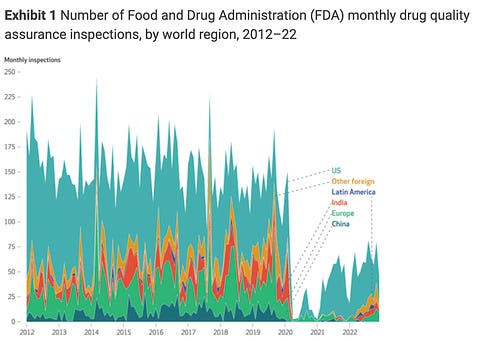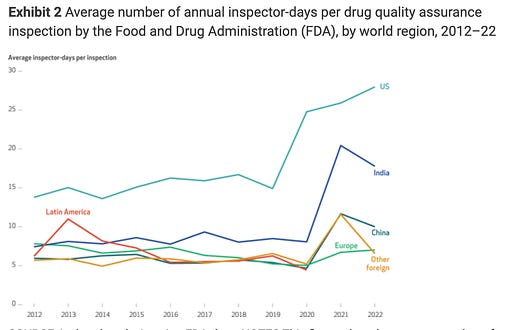Today, I'm delving into three important topics, covered from a Christian conservative/free market and nationalist perspective. I will place each within a global geopolitical framework.
My goal over the past four years of the COVID crisis has been to decipher our collective experiences. This has guided me to focus on the broader, more comprehensive picture.
Throughout this past year, I have actively participated in three " 'Global Crisis Summits' (Brussels at the EU Parliament, Romania, and Washington DC in conjunction with CPAC), among numerous others. Just three days ago, I returned from Romania, where I had the privilege of speaking at the 'Make Europe Great Again' conference. These experiences have underscored the fact that our understanding of the COVID crisis is most effective when viewed within a broader global context.
Today, I will dig into three fundamental topics that have been at the forefront of what has happened over the past few years.
1) Medical Industrial Complex
2) Censorship, propaganda, and psychological warfare technology
3) Globalization versus nationalism, and a battle worth fighting
1. The Medical Industrial Complex
We need to start with the meaning of words.
"Medical Industrial Complex" refers to the increasingly powerful, transnational, public-private partnerships linking academia, pharma/biotech and both national government and supra-governmental organizations such as the United Nations and its Agenda 2030 treaty, the World Health Organization and its International Health Regulations, and the World Economic Foundation among others.
These types of public-private cooperative relationships have a name. That name was created by Benito Mussolini. We know this name. The name is Fascism (corporatism). That is the union of the state and corporate power. We should call it what it is.
One of the things that has happened throughout the COVID crisis and the ongoing process of globalization and harmonization is the weaponization and perversion of language.
We have to call things by their true names despite what that may imply or how the press may react to it. For example, we are not far-right. We are center-right. The truth is that our opponents have become far-left. We have allowed the press and corporate media to redefine language and demonize us as far-right, but the truth is that they are the radicals. They are the far-left. We have to refuse to allow them to capture and pervert our language. We must take it back.
Language controls thought. It controls how we structure our understanding of the world.
Pharma and biotech are major global economic engines, and the profit and power of this sector have allowed managerial leaders in this sector to become more powerful than individual nation-states through corruption, electoral interference, and economic hegemony. The COVIDcrisis provides abundant examples to illustrate this. Weaponized fear of a modestly pathogenic respiratory virus has enabled the sector to extract concessions and wealth from both national and supernational (EU) organizations. At this point, there does not appear to be any organization that can hold these "public-private partnerships" accountable for their actions and misdeeds.
Pharma and biotech were once major economic engines for the US and European economies. They are no longer. Overall, these sectors are now increasingly dominated by US and EU competitors, in particular our unrestricted warfare competitor, the Chinese Communist Party (CCP), and our geopolitical frenemy, India.
To the extent that drugs and biologics are manufactured in the USA, they are made using precursor compounds that are also manufactured by CCP and Indian-controlled companies. If the USA and NATO find themselves in a major "hot" conflict with these offshore competitors, we will find ourselves without access to essential medicines within weeks due to supply chain restrictions.
Much of the current drug supply is manufactured offshore in facilities that are essentially self-monitored, as the FDA has chosen to rely on local inspection and monitoring. The FDA assumes that these quality control processes are being performed according to US regulatory standards (NOT). To the extent that independent monitoring of imported drug and biological products has been performed, the data indicate that FDA "trust" in this offshore quality control monitoring is misplaced.
Exhibit 1: The FDA conducted no inspections in China or India between April 2020 and March 2021.
Exhibit 2 shows that FDA inspector days for the Chinese region were less than ten days per year.
Chinese pharmaceutical imports in 2022 were around $196 billion, the second-largest U.S. goods import, just behind the automotive industry.
The US Federal response to this threat has not been to create policies favoring repatriation of these industries to the US and its allies, but rather to fund a Virginia facility to stockpile precursor compounds. But Congress has not followed through on even this modest program, and although the facility has been obtained, the purchase of the stockpile has not been funded.
Meanwhile, the integrity, transparency, consistency and reliability of the FDA has been compromised. A massive wave of retirements and resignations has resulted in the agency being transformed from within, due to loss of both expertise and the rise of a politicized culture largely staffed by non-US trained personnel. Today's FDA is one in which regulatory decisions have become unpredictable, arbitrary, and capricious, as well as decoupled from previously accepted international norms. The revolving door between FDA retirees and big pharma gets ever larger.
The corruption of the FDA is now recognized worldwide, and this has eliminated a key US competitive advantage. Previously the FDA was seen as the global "gold standard" neutral guarantor of biopharmaceutical product purity and quality. Now the FDA acts to choose winners and losers in the global competition to innovate in order to address unmet human health needs (and to generate profit and industrial growth by doing so).
The loss of FDA integrity has destroyed the logic that purchasing and importing US biopharmaceutical products merits higher costs to ensure higher quality. Politicized governmental actions have economic consequences.
2. Censorship, propaganda, and psychological warfare technology
Social media developed by the US intelligence and enhanced by the UK intellectual community has been developed as a weapon. Make no mistake about it, social media as we know it; Facebook, Twitter- as it was formerly embodied, all of these social media tools are weapons. They are psychological warfare weapons. They were designed as weapons.
They were designed and deployed in Arab Spring as political psywar weapons in order to facilitate regime change. This strategy is considered a huge success by US intelligence. Then the shock came when Nigel Farage and his UK Independence Party used social media to achieve Brexit. This was done in large part via decentralized social media communication, and that shock was further enhanced when Mr. Trump became President Trump. Suddenly, the United States intelligence community, the State Department, and all the infrastructure that they control and use to exert control all over the world woke up and recognized that they had a problem. And that problem now extends to the populist movement here and across the world, a populism which we represent as center-right conservatives.
That challenge now represents an existential threat to NATO itself, because if Europe wakes up to the techno-totalitarianism that is being imposed from the central bureaucracy in Brussels (that is, the European Union), and it begins to exert the value of the independent nation-state, there is a perceived risk by the US State Department and intelligence community that the European Union, that structure that has been created to hold a Europe together will dissolve. It will fragment, and if that fragments, NATO will fragment, and if NATO fragments, then the United States Foreign Policy Establishment believes that they will find themselves at significant military and geopolitical disadvantage in an increasingly multilateral world.
This is resulting in a response from the US Intelligence Community and State Department, in which they feel justified to employ virtually any non-kinetic method in order to enforce and maintain the current status quo. Recognize that this is the case. To be clear, I'm not advocating for the dissolution of the European Union or the dissolution of NATO. I am reporting to you that this is the perception of the American and the five Eyes intelligence community, and they will do anything to avoid this consequence. They feel justified by the utilitarian logic that "anything goes, the ends justify means", in order to defend the current world order and the plans for the future that they have developed.
As a consequence, psychological warfare technology is being widely deployed by "democratic" governments. This is technology that was developed for offshore combat. NATO considers this to be a central tenet of its current warfare planning. NATO calls psychological warfare technology a key aspect of modern hybrid warfare. This advanced technology is being deployed by governments and globalists on common citizens now because of the existential threat to the dissolution of the European Union, the perceived existential threat to NATO, and the need to maintain consensus by controlling all information in an increasingly multilateral world. This is being accomplished through propaganda techniques (such as the IC denial that Hunter Biden's laptop was real in 2019), neuro-linguistic programming, and nudging, as well as censorship and the manipulation of internet algorithms of search engines.
In other words, in response to the threat of China, Russia, the rise of the Middle East, the fall of the petro-dollar, there is a widely accepted belief among the western "democracies" that it is necessary and acceptable to deploy psychological warfare technology on their citizens.
I argue this is fundamentally unethical. Psychological warfare technology, as it is currently being deployed and has been developed, can completely control all aspects of information that you receive, what you think, what you feel, and what you hear.
In a world in which governments feel it is acceptable to deploy psychological warfare technology on their citizens, the concept of individual and national sovereignty becomes completely obsolete. We can argue about whether or not "in-person voting" or "remote ballots" or "long periods for voting" is enabling for voter fraud. But all of this is completely irrelevant in the face of modern psychological warfare. When this psywar technology is deployed on citizens by their government, when everything that they hear, feel, think, believe, is controlled through this tech, through social media, through established media, through all messaging- then the nuance of voting is completely irrelevant.
Again, this is unethical and a breach of human rights. Humans have the right to access information in a democracy, which is fundamental to the social contract. How can we have a social contract when the citizens of nation-states are not allowed the information to make informed decisions? That's where we're at right now, and it's justified because of the fear of this existential crisis.
This is evil as far as I'm concerned. This is a major breach of human ethics. We're disrespecting the ability of individuals to act as sovereign beings.
Most importantly, the deployment of propaganda and censorship blocks innovation and adaptation to change. Cultures cannot adapt; they cannot innovate if they don't have access to full, diverse, accurate information. This is the most important thing of all. We will become stagnant. Do we have examples of this type of stagnation? What happens when information is completely controlled? The former Soviet Union knows the answer. Those who lived under Ceausescu in Romania know the answer. Those who lived under Salazar in Portugal know the answer.
"Who is Robert Malone" is a reader-supported publication. Please consider a donation to support our work.
3. Globalization versus nationalism, and a battle worth fighting
There are many lessons that we can learn from the COVID crisis, but one of the key ones has to do with "what is globalism". We toss this term around, we never seem to define it. It's as if it's amorphous beast. We can't put our hands around it.
Globalism is central planning.
.We have seen the effects of central planning during the COVID crisis. The former residents of the Soviet Union understand central planning. We understand the harm that comes from central planning, from bureaucrats determining our future, making decisions about how a nation state, an economy of people, should adapt to changing conditions. During COVID we have seen how easily centralized planning can be corrupted and perverted to support a wide variety of hidden agendas.
Central planning is also associated with cultural homogenization, the drive to create one culture, which is basically driven in the current case by intentional destruction of diversity to reduce economic friction.
This globalization thrust is basically justified by large economic forces in order to support the agenda of transnational, globalist organizations, particularly corporations in their cooperative relationships with large transnational governmental organizations. Recently, Blackrock CEO Larry Fink spoke the quiet part out loud, when he discussed the need to reduce the global human population and substitute robotic workers to produce goods and services. This is all perversely driven by a model for future society collectively referred to as transhumanism.
This is anti-human. This is a death cult, aligned with a wide range of promoted anti-human policies including abortion, destruction of religion and family values, and of course the abomination of gender reassignment surgery and transgenderism.
These policies are being actively and globally promoted using censorship, propaganda, and modern psywar methods.
We must have access to unrestricted information, which means free speech and freedom of thought. Now, that comes at a price—a price of personal responsibility, a price that people will be potentially exposed to information that may be damaging or offensive. But if we refuse to allow them to have access to information and diversity of thought, we will prevent our ability as nation-states and cultures to adapt to changing conditions.
And if there's one thing that we absolutely must have right now, it's the ability to innovate and adapt. That's how we escape the Malthusian trap. All this fear of global warming and population growth; that's what this is all about. And the counter argument to the Malthusian argument is that humans adapt. Humans can change, humans can innovate. But they can't innovate if all information is controlled.States and cultures which resist propaganda
, censorship, and weaponized fear have a competitive advantage. In a multilateral world, Romania should not apologize for advocating for autonomy. Independent European nation-states should not apologize for going their own way and innovating. They must do so. They must do so because it will give them a competitive advantage.
I argue that independent nation-states are the laboratory for innovation, cultural innovation, political innovation, and economic innovation. They must be allowed sovereignty and autonomy. If they don't, the world's ability to adapt to change will be stifled.
The best way to allow the world to adapt to change is by respecting the principle of subsidiarity. This is the concept that decision-making authority should be delegated to the smallest, most local competent level. The principle of subsidiarity demands decentralization. The ultimate component of a decentralized adaptive world is not the nation-state, it is the family. We need to celebrate the family as the core of the principle and thrust of the concept of subsidiarity.
The weaponization of fear via propaganda to control people is unethical. We have seen repeated justification by academics and bureaucrats and governments and transnational organizations - that the weaponization of fear is acceptable in the service of the overall public good as they define it. We have seen this in the case of the COVID crisis in the service of public health. The weaponization of fear by governments to control people is unethical, and it should not be allowed under any circumstances. It should not be tolerated. We must call it out when we see it.
Last point: We have a difficult fight ahead of us. This difficult fight is not going to be resolved with one election, the election of one politician, or a change in leadership at the European Council or the President of the United States. These issues have been developing for decades, in many cases for at least a century, and they are not going to be resolved in the short term.
We have a long-term fight in front of us, which will require years of effort in fighting this fight.
Do not self-victimize, and don't complain. Again and again, I hear this cry of
"poor me".
"It's such a hard job we face".
"There's so many obstacles".
"Our opponents are so entrenched, they're so powerful".
"They have so many forces".
"They control the media".
"They are so mean".
"They are so unethical".
Stop whining. We have a fight. We have to fight that fight, and it does no good to complain.
It's a wonderful thing. What a wonderful thing to have a worthy opponent.
It is the greatest gift in the world, and by God, we have a worthy opponent. We must not complain. We must not shirk. We must confront the evil that is ahead of us, and it is not going to be easy.
Fight for your future and that of your children. Celebrate this opportunity to fight for your future. What a gift to have an opportunity at this point in time to make a difference. Celebrate it.
Refuse to be a victim. Choose life, not death. Do not apologize, and fight for life, freedom, and sovereignty.




